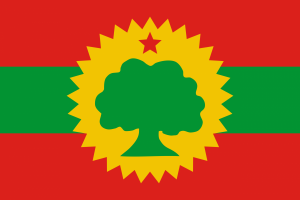Language/Borana-arsi-guji-oromo/Grammar/Plurals
Hi Borana-Arsi-Guji Oromo learners! 😊
In this lesson, we will learn about plurals. Plurals are an important part of any language, and they help us communicate clearly when we want to talk about more than one thing. We use plurals with nouns, verbs, and pronouns. So, let's get started!
Don't hesitate to look into these other pages after completing this lesson: Conditional Mood, Questions & How to Use Have.
Basic Concepts[edit | edit source]
To form plurals in Borana-Arsi-Guji Oromo, we usually add the suffix "-to" to the singular form of a noun. For example:
| Borana-Arsi-Guji Oromo | Pronunciation | English |
|---|---|---|
| booli | ['bo:.li] | child |
| boolito | ['bo:.li.to] | children |
As you can see, we added the suffix "-to" to "booli" to form "boolito." This is a basic rule for forming plurals in Borana-Arsi-Guji Oromo, but there are some exceptions.
Exceptions[edit | edit source]
There are a few exceptions for forming plurals in Borana-Arsi-Guji Oromo. For example:
| Borana-Arsi-Guji Oromo | Pronunciation | English |
|---|---|---|
| gabatee | [ga'bæ:.te] | cow |
| gabacha | [ga'ba.tʃa] | cows |
In this example, we added the suffix "-cha" instead of "-to" to form the plural form of "gabatee." This is an exception to the rule.
Another exception is when the singular form of a noun ends in "-a" or "-e." In this case, we add the suffix "-tii" instead of "-to." For example:
| Borana-Arsi-Guji Oromo | Pronunciation | English |
|---|---|---|
| mintii | ['min.ti:] | person (singular) |
| mintito | ['min.ti.to] | people (plural) |
In this example, we added the suffix "-tii" to "minti" to form "mintito."
More Examples[edit | edit source]
Here are some more examples of singular and plural forms in Borana-Arsi-Guji Oromo:
| Borana-Arsi-Guji Oromo | Pronunciation | English |
|---|---|---|
| warqee | ['war.qe:] | leaf (singular) |
| warqeto | ['war.qe.to] | leaves (plural) |
| ya'ii | ['ja:.ji:] | woman (singular) |
| ya'iito | ['ja:.ji.to] | women (plural) |
| qurqeefee | [quɾ.'qe:.fe:] | tiger (singular) |
| qurqeefetto | [quɾ.'qe:.fe.tto] | tigers (plural) |
Dialogue[edit | edit source]
Here is a dialogue to practice using plural forms in Borana-Arsi-Guji Oromo:
- Person 1: Booli kanaa guddaa naa waan darbaniif boolitootiin irraa dhufani? ("Can I bring my children to the park with your children?")
- Person 2: Ee, boolitootiin guddaa naa irraa hinfakaatu. ("Yes, you can bring your children with us.")
Cultural Tidbit[edit | edit source]
In Borana-Arsi-Guji culture, it is common for families to have many children. Children are seen as a blessing, and having a large family is a sign of prosperity and wealth. In fact, it is not unusual for families to have ten or more children!
Practice Exercise[edit | edit source]
Translate the following sentences from English to Borana-Arsi-Guji Oromo:
1. The trees in the forest have many leaves. 2. My friends and I are going to the market. 3. They have two cows and one bull.
Sources[edit | edit source]
➡ If you have any questions, please ask them in the comments section below.
➡ Feel free to edit this wiki page if you think it can be improved. 😎

